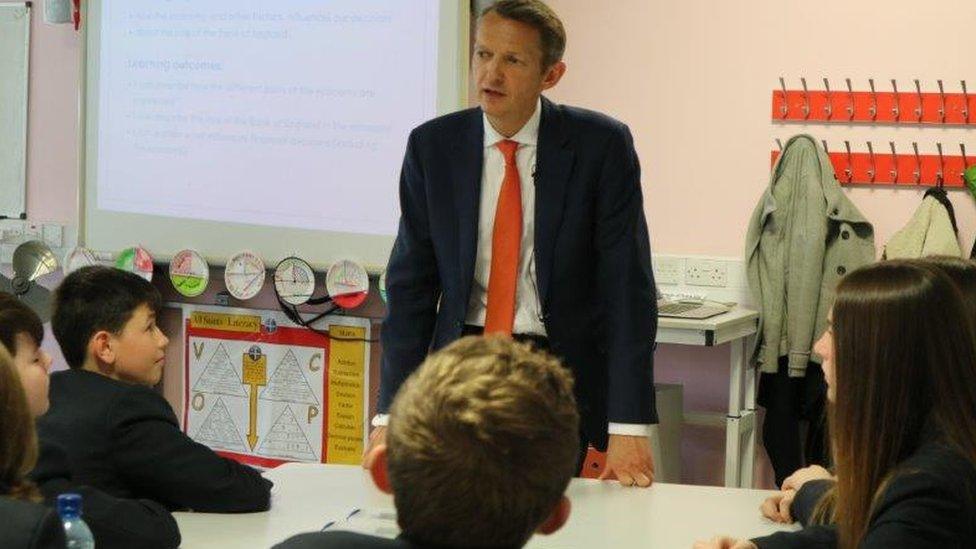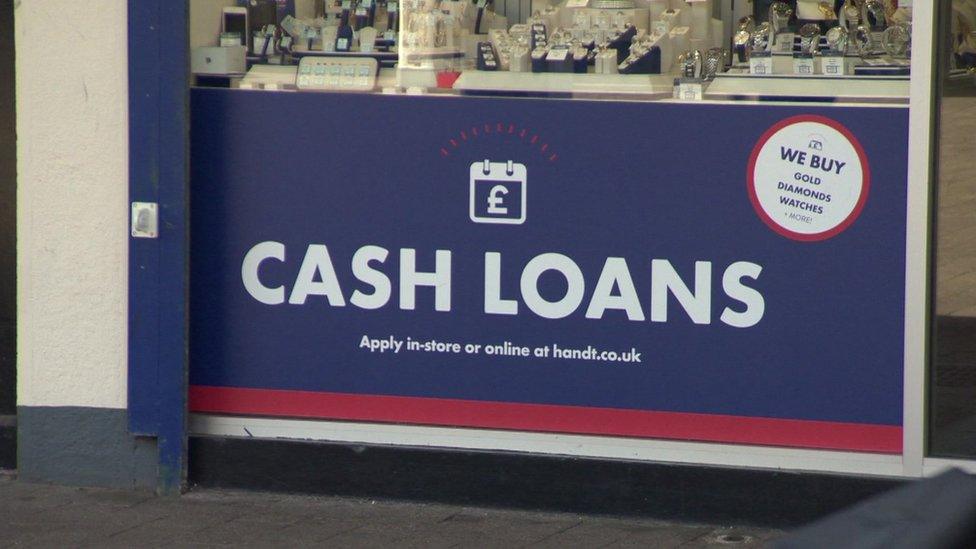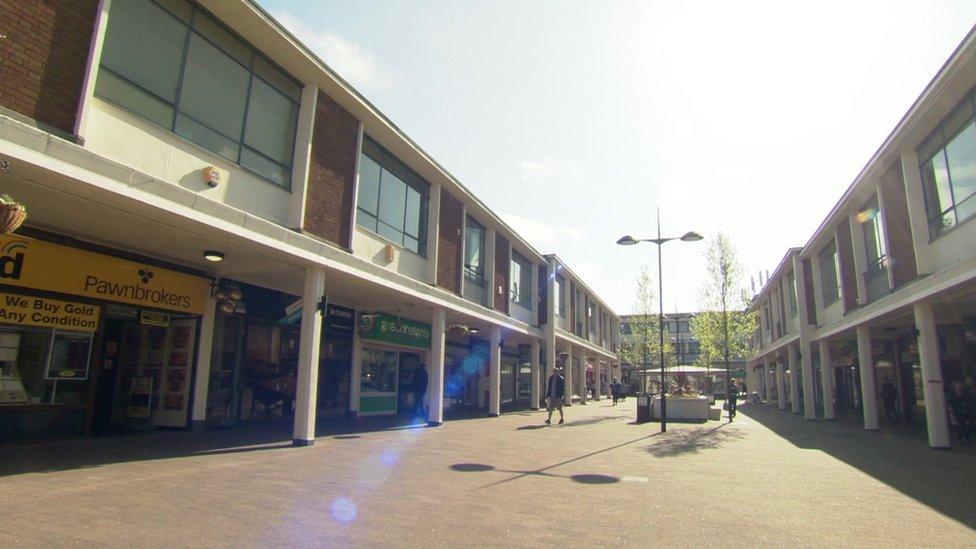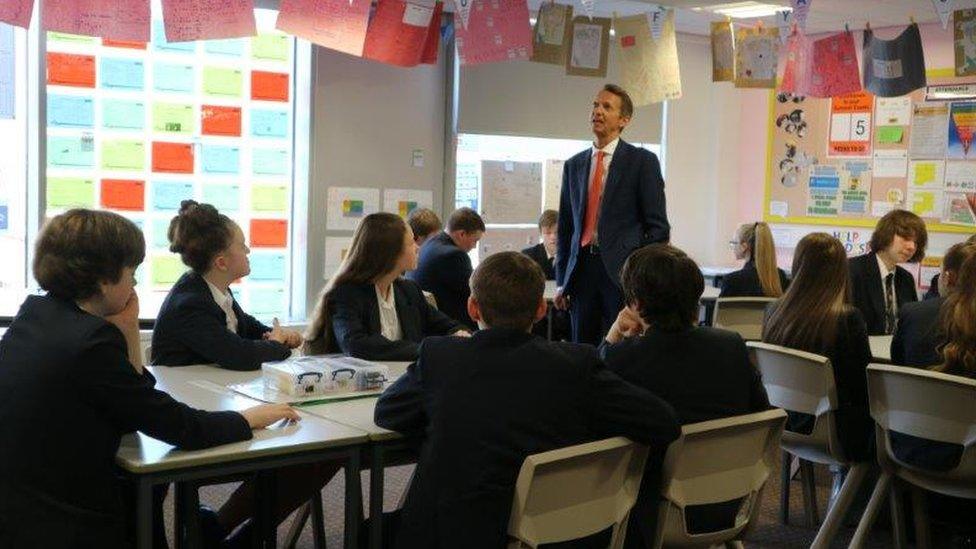Home truths on the High Street for Bank of England boss
- Published
- comments
Pupils at All Saints Catholic High School describe what they understand about the economy
Ask a bunch of teenagers about the economy, and they know where their money will go as adults.
Buying a house, a car, and being able to provide for their own children are their priorities for the future.
The Bank of England wants them to be better equipped to make those big financial decisions.
Andy Haldane, the Bank's chief economist, believes financial literacy should be built into the core curriculum early in secondary school.

"There is a huge gulf between the amount of resource and effort put into core literacy and numeracy, which are fundamental, and what we put into economic and financial literacy," he said.
He argues education can help reach what he describes as the "long tail of communities, towns, companies and schools" that are disconnected to the economic and social mainstream.
The Bank of England hopes to reach a thousand secondary schools by the end of next year with new resources that can be used for lessons with Year 8 and 9 pupils.
'Tricky choices'
The EconoMe lesson plans explore basic economic ideas such as interest rates on borrowing and saving.
Personal decisions are then connected to the functioning of the wider economy.
"Understanding those tricky choices about finances or jobs that are so crucial to people's life chances - more of that needs to be in the mainstream of the curriculum, perhaps even a compulsory part" says Andy Haldane.
The Year 9 pupils at All Saints Catholic High School in Kirkby, Knowsley, are the age group he's talking about.
I took Andy Haldane to the school because it is in an area where families, despite being in work, are often having to manage on very tight household budgets.

Almost a decade of austerity has eroded the spending power of families here.
Kirkby once had the biggest industrial estate in Europe, now more jobs are in distribution than manufacturing.
On the High Street, cash loans are available from pawnbrokers for eye-watering interest rates.
'Wages not guaranteed'
For families with a broken washing machine, fridge or cooker, the rent-to-buy company Brighthouse is the most visible white good retailer.
It's been criticised by the Financial Conduct Authority for not acting as a "responsible lender".
The head-teacher of All Saints, Tony McGuiness, says they are well aware that part of their job is to help equip pupils for adult life.
"Financial literacy is particularly important in communities like our own in Kirkby, where people may not be in employment 52 weeks of the year, there may not be a guaranteed wage packet."

Some pupils will see their parents turn to high interest loans.
Mr McGuinness says: "For some of our parents the pressure is on, they need money tomorrow to pay bills and make sure the kids have got the equipment to go to school, so unfortunately they may have to go into a shop with extortionate rates."
"Isn't this the point?" I ask Mr Haldane.
He may talk about EconoMe - but for families who feel they have few financial choices, advice from the Bank of England may feel remote.
"I know that, I see that," he says, "I hear those narratives, it helps me understand how the economy is functioning."
The education resources from the Bank are part of a wider effort to connect economic policy with the lives of communities that feel they experienced little financial dividend from the years before 2008.
'Social fabric'
Kirkby has long had a credit union, something Mr Haldane, says is a crucial part the social fabric.

When I stop parents on the High Street in Kirkby later, most welcome the idea of teenagers learning more about how to manage their money as adults.
The Bank of England wants to be seen to reach out to schools, but with massive changes underway already in the curriculum and GCSEs , the capacity to add more may be limited.
Geoff Barton, general secretary of the Association of School and College Leaders, said financial literacy is already studied as part of citizenship, PSHE and maths.
"We don't agree that it needs to be made a separate compulsory subject in a curriculum which is already bursting at the seams.
"What is vital is high-quality teaching of financial literacy. However, there is a severe shortage of teachers in general which is making recruitment extremely difficult."